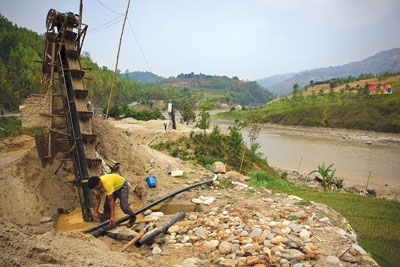 FOO CHEE CHANG |
The Parliamentary Committee on Natural Resources and Means banned sand and stone exports to India on 8 January because of the massive environmental damage it had caused in the Chure Hills. The move was cheered by environmentalists, but bitterly protested by industrialists, who warned of pernicious consequences for the economy. The Ministry of Commerce and Supplies then revoked the ban on 23 February because of the decrease in revenues, which amounted to Rs 2.5 billion in taxes a year.
The ministry's decision led to a public spat with the parliamentary committee, but the two sides ultimately resolved to temporarily relax the ban while a commission consisting of members from several ministries decides how best to balance the economic and environmental interests at stake. "There is no ban currently, but the commission is discussing how to regulate sand mining in a systematic manner," says Jairam Ghimire of the Department of Mines and Geology. "A final decision is due in three months." In the meantime, a 122 per cent increase on the sand and stone export duty has been imposed.
Although the ban has been lifted, the government's messy handling of the affair has already crippled the crusher industry. Before the ban, there were 200 crushers transporting a total of half a million truckloads of sand and stones to India every year. About 80 per cent of those crushers are now out of business.
"The ban lasted 100 days. In that time, our Indian clients found other crushers within India. We lost our main clients," says Ram Adhikari, who operates a crushing plant in Butwal.� Adhikari used to make a profit of Rs 3,000-3,500 per truckload of sand exported to India, but that has now dwindled to about Rs 200. That figure may come down further as crushers race to undercut one another to increase their market share . "As it is, Rs 200 is barely enough to survive," says Adhikari.
Ominously, many crushers have been unable to pay back loans on equipment they purchased before the ban was put in place, straining the balance sheets of already beleaguered banks. About three quarters of crushers took loans from financial institutions. "Traders have not been able to pay back bank loans, and it is more than likely that they'll have to sell their houses to do so," says Krishna Prasad Sharma, President of the Crusher Industries Association. Last year, crusher industry owner Jugal Kishore Yadav of Kapilvastu committed suicide because he couldn't settle his debts.
This is not to say the industry is blameless. The environmental impact of sand and stone mining in the Chure Hills has been devastating. Large parts of the range have been defaced and in consequence absorb less water, increasing the likelihood of floods and landslides. Thousands of livelihoods have been affected.�Roads have also been damaged by trucks carrying twice the legal limit of gravel, and in some sections national highways have been reduced to dusty tracks with deep ruts in them.
What is necessary is a resolute policy stance. "We can't ban sand mining altogether, but we can regulate it more tightly, so that tax revenue increases, the environment is protected, and industries stay afloat," says Prakash Jwala, who chaired a 2008 commission that looked into the matter. "Right now we're losing on both environmental and economic fronts."


